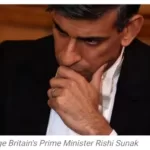In a groundbreaking move on Wednesday, 194 countries and the European Union approved a historic agreement at the COP28 summit in Dubai, signaling a decisive shift away from fossil fuels. The Emirati president of the summit, Sultan Al Jaber, commended the nations for prioritizing common interest over self-interest and facilitating a consensus after 13 days of intensive talks.
Describing the deal as a “transformational change,” Jaber emphasized the restoration of faith in multilateralism and humanity’s ability to unite. The European Union’s climate chief, Wopke Hoekstra, called the agreement “long overdue” and noted that it marked the beginning of the end of reliance on fossil fuels after nearly 30 years of climate meetings.
The agreement, carefully crafted to secure consensus, calls for the “transitioning away from fossil fuels in energy systems, in a just, orderly and equitable manner.” Acknowledging the critical decade ahead, it aims for no net greenhouse gas emissions by 2050 to combat the rising threat of climate change.
While the agreement received global acclaim, concerns lingered, especially among island nations facing the imminent threat of rising sea levels. John Silk, negotiator from the Marshall Islands, likened the final agreement to a “canoe with a weak and leaky hull” but acknowledged the lack of alternative options.
Representatives from small islands expressed disappointment in the agreement’s perceived weakness. Samoa’s chief negotiator, Anne Rasmussen, emphasized the need for an “exponential step change in our actions,” drawing attention to the incremental progress achieved.
US climate envoy John Kerry lauded the agreement as a clear endorsement of limiting global warming to 1.5°C and highlighted efforts to garner support from oil-producing countries, including Saudi Arabia. Saudi Energy Minister Prince Abdulaziz bin Salman praised the agreed-upon language, emphasizing a process of transition rather than an immediate or gradual end to fossil fuels.
To alleviate geopolitical tensions, Kerry engaged in discussions with China, resulting in a joint call to intensify efforts on renewable energy. While China emphasized the responsibility of wealthy nations to assist the developing world, Brazil expressed similar sentiments, as it prepares to host the 2025 climate talks in the Amazon.
The Dubai summit also reached an agreement on establishing a loss and damage fund to compensate countries severely impacted by climate change. However, the text stopped short of endorsing a “phase-out” of oil, gas, and coal, accounting for three-quarters of emissions responsible for the planetary crisis.
Environmentalists generally welcomed the agreement as a significant step forward, though many cautioned that more actions are needed. Mohamed Adow of the Power Shift Africa think tank emphasized the importance of acknowledging the “elephant in the room” and predicted future COP meetings would intensify pressure on transitioning away from dirty energy.
The agreement explicitly outlined near-term goals, calling for a 43% reduction in greenhouse gas emissions by 2030 compared to 2019 levels. However, critics, including Jean Su of the Centre for Biological Diversity, pointed out “cavernous loopholes,” such as the recognition of a role for “transitional fuels,” interpreted by some as code for natural gas.
The deal primarily addresses fossil fuel use in energy, leaving industrial areas like plastics and fertilizer production untouched. It supports a phasedown of “unabated” coal power, preserving a role for this contentious energy source if carbon capture technology is utilized, a move criticized by environmentalists as unproven.
By AFP







